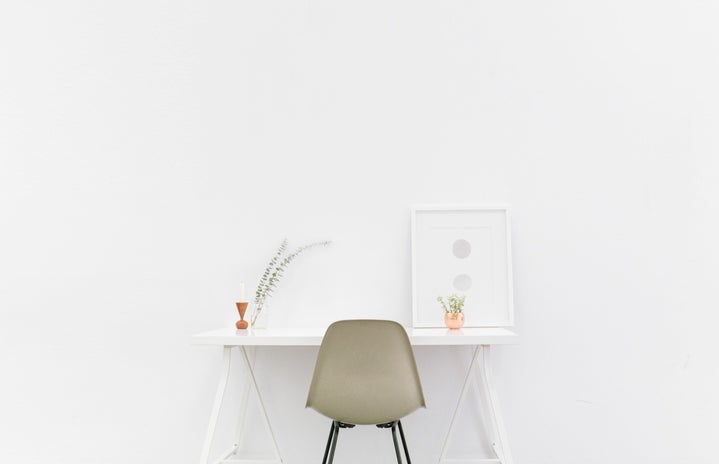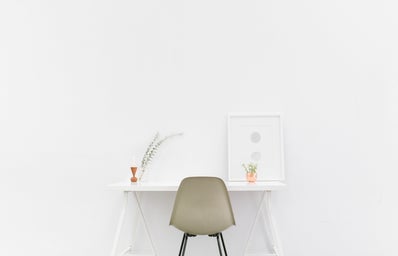When people think of minimalism, they might think of white walls and practically empty, soulless rooms. They might think of owning one shirt, one pair of pants, one pair of socks—dressing the same way every day, coming home after work to cook in one pan, eat from one plate, and skip TV-before-bed because there’s no TV in the house anyway. While some people may choose to live like this, you don’t need to strip yourself of absolutely everything that you could live without in order to practice minimalism.
What is minimalism?
So, to better define it, what exactly is minimalism? Minimalism is keeping things simple—buying, using, and having the things that contain necessity, purpose, and joy. Yes, you can still keep your TV, you can wear different clothes, and you can own more than one of every utensil and dishware. The point of minimalism is to avoid overconsuming and cluttering up your life. It is meant to remove the unnecessary excess so you can make room for the things you really want in life.
Decluttering your life.
It’s no secret that your environment can greatly impact your mood and mental health. When your room is messy, you feel a little frazzled and frustrated. On the other hand, when things are clean you can be more focused and calm. If physical items can have this kind of impact on us, it makes sense to see decluttering as not just making more physical space, but as making room for time and energy as well. Considering that people only have a finite amount of energy to use every day, when you’re not overwhelmed by outfit options or wasting your time trying to find one thing under a pile of many other things, it saves you a lot of time and energy which you can refocus on the things that are more important to you. In other words, decluttering your space also declutters your life.
Saving money.
Of course, being a smart consumer and not spending money on things you don’t need will also help in the financial department. The money that you aren’t wasting on unnecessary things might shock you, because the cost of those unnecessary things can really pile up after a little while. Rather than wasting it on a little thing here and there, when you let that money grow, you can use it on much more valuable things, such as paying off debt as well as investing in experiences.
The grass isn’t greener on the other side.
When we waste a lot of money on things we don’t need, we can also fall into the trap of thinking that everything is greener on the other side. Items become ways to achieve dreams and define people. Rather than buying lipsticks for $12, you might purchase them for $50 just because it’s Chanel and you want to live the dream of glamour with the aesthetic they market. You might feel like your life isn’t as great as you want it to be, and the items you buy end up being how you try to “fix” things. And while the joy from getting a new purchase can be intoxicating, it dies down until you get yourself something new.
Adhering to a lifestyle in which you get a chance to value the things that you already have can help you feel good about where you are and what you have. Feeling grateful and happy with your physical possessions can in turn also help you feel happier about where you are in life and how you feel about yourself. Having said that, there’s nothing wrong with owning a Chanel lipstick, as long as you use it and enjoy it. The point is to not over-consume expensive lipsticks (or anything, really) and to try and find that greener grass on your own side.
Consumerism is a big part of today’s society as well as today’s global issue. There’s always more things, newer things, and more interesting things to buy. People update their phones to have “the latest version” before their old phones go bad, and buy fast fashion to keep up with the trends only to shove everything to the back of their already-congested closets in a few months when the trends die down. It’s not a sustainable lifestyle and it isn’t good for the environment or the people either.
In the example of fast fashion, a lot of companies exploit workers from third world countries in order to have competitive prices while also keeping up with the insanely quick changes in what’s popular. Those workers work under cruel conditions, with extremely demanding hours, for only a few pennies. These industries also exploit the earth’s resources and contribute to pollution and climate change. For example, jeans, which are a fashion staple and are therefore high in demand, are “the result of several chemical-heavy washes” that significantly contribute to polluting the world’s water.
Minimalism is meant to combat this toxicity as well. When you are living with purpose and only buying the things necessary for you, you become more aware of how much excess there really is in the world, and how much of a role you have to play in it. It makes you a more conscientious and thoughtful consumer, which is necessary in order to coax companies into finding more sustainable and ethical solutions for production.
The good news is, minimalism is becoming more popular. The Marie Kondo phenomenon that took over the world on January 1st, 2019—marked by the release of Netflix’s Tidying Up with Marie Kondo—inspired many people to declutter and donate. Recently, thrift stores have also been rising in popularity, perhaps in part due to many popular thrifting videos on YouTube, which helps reduce demand for fast fashion industries.
So, you can continue to live with a TV, a couple of diverse outfit options, and some nice crockery neatly stowed away in your cupboards, but make sure that what you own is what you need and what you enjoy having. Be a critical consumer and think about your impact on industries, other people, and the environment. Be grateful for what you already have and purchase with purpose. Remember, being a minimalist, in the simplest definition, means to live with purpose, to be grateful for what you have, and to make room for the truly important things in life.


